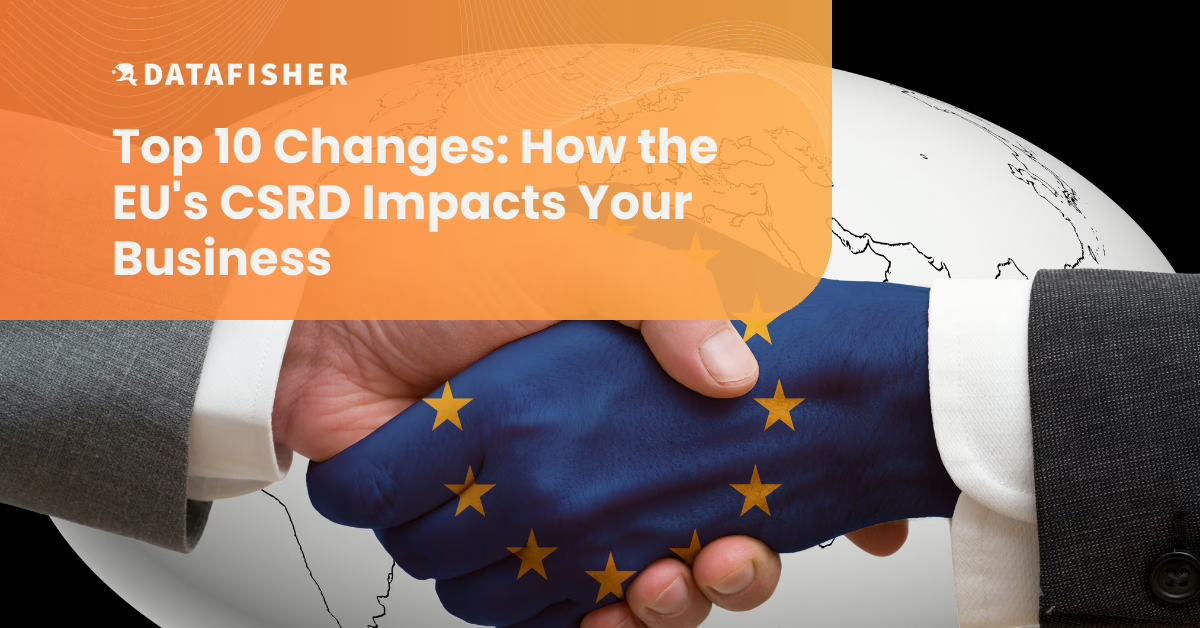The European Union’s Corporate Sustainability Reporting Directive (CSRD), effective January 5th, 2023, marks a significant shift in corporate transparency. This legislation requires a wider range of EU companies, along with qualifying subsidiaries of non-EU companies, to disclose their environmental and social impact, as well as how their environmental, social, and governance (ESG) actions influence their business.
The CSRD represents a major step towards a more sustainable European economy, pushing companies to integrate sustainability practices into their core operations. But for businesses, it also necessitates significant changes.
Here’s a breakdown of the top 10 ways the CSRD will impact your company:
1. Expanded Reporting Scope: Previously, only large public-interest entities with over 500 employees were required to report on sustainability. The CSRD broadens this net to include:
- All large companies (meeting two out of three criteria: 250+ employees, €40 million turnover, €20 million total assets)
- Listed SMEs on regulated markets
- Non-EU companies with a substantial subsidiary or branch in the EU exceeding specific thresholds (€150 million turnover in the EU for two consecutive years)
This means a significant increase in the number of companies needing to comply.
2. Double Materiality: The directive emphasizes “double materiality,” requiring companies to report on:
- Impact on Sustainability: How your company’s operations affect environmental and social issues (e.g., greenhouse gas emissions, employee diversity)
- Sustainability’s Impact on Business: How environmental and social factors (e.g., climate change, resource scarcity) pose risks or opportunities to your business model and long-term strategy.
This holistic approach provides stakeholders with a deeper understanding of your company’s sustainability efforts and their connection to financial performance.
3. Standardized Reporting Format: Mandates the use of the upcoming European Sustainability Reporting Standards (ESRS) for disclosures. These standards will provide a harmonized framework for reporting, ensuring comparability and transparency across industries. This eliminates the current patchwork of reporting methodologies, making it easier for investors and other stakeholders to compare companies.
4. Increased Focus on Governance: Goes beyond environmental and social concerns, placing greater emphasis on governance practices related to sustainability. Companies will need to disclose how they integrate sustainability into their governance structures, including board oversight, risk management, and stakeholder engagement. This pushes companies to embed sustainability throughout their decision-making processes.
5. Supply Chain Transparency: Encourages companies to report on the sustainability practices within their supply chains. This includes identifying and managing environmental and social risks within your supplier network. This could necessitate collaboration with suppliers to improve their sustainability practices.
6. Digital Reporting: Emphasizes the use of a European Single Electronic Reporting Format (ESEF) for reporting. This standardized digital format will streamline reporting and facilitate accessibility for stakeholders.
7. Auditor Involvement: While not explicitly mandatory for all companies, the CSRD paves the way for the future possibility of mandatory sustainability report audits. Companies should anticipate increased scrutiny from investors and stakeholders who may request independent verification of their sustainability claims.
8. Enhanced Stakeholder Engagement: Focuses on the importance of stakeholder engagement in the reporting process. Companies are encouraged to identify and understand the sustainability concerns of their stakeholders, including investors, employees, and communities. This could involve stakeholder surveys, workshops, and other engagement activities.
9. Reputational Risk and Brand Value: Transparency around sustainability practices is increasingly crucial for a company’s reputation. Empower stakeholders to hold companies accountable for their environmental and social impact. Companies that demonstrate strong sustainability performance can enhance their brand value and attract responsible investors. Conversely, those falling short could face reputational damage.
10. Long-Term Business Resilience: By encouraging companies to consider the impact of environmental and social factors on their business, promotes long-term business resilience. Companies that proactively manage these risks and opportunities are better positioned to navigate a changing landscape and secure their future success.
Conclusion
The CSRD represents a significant step towards a more sustainable future for European businesses. While it necessitates changes, it also presents an opportunity. Companies that embrace the directive and integrate sustainability into their core strategies will be well-positioned to thrive in the years to come. By proactively addressing environmental and social challenges, they can build trust with stakeholders, enhance their reputation, and ensure long-term business success in a world increasingly focused on sustainability. Datafisher can assist with internal training on implementing the CSRD and all other aspects of compliance.
